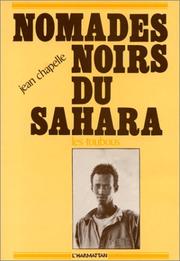| Listing 1 - 2 of 2 |
Sort by
|

ISBN: 2858022216 9782858022212 Year: 1982 Publisher: Paris L'Harmattan
Abstract | Keywords | Export | Availability | Bookmark
 Loading...
Loading...Choose an application
- Reference Manager
- EndNote
- RefWorks (Direct export to RefWorks)
Daza (Dazaga-speaking people) --- Teda (African people) --- Daza (African people) --- Brawiya (African people) --- Guezebida (African people) --- Tebau (African people) --- Tebou (African people) --- Tebu (Tedaga-speaking people) --- Tedaga (African people) --- Tedagada (African people) --- Tibbu (African people) --- Tibbu (Tedaga-speaking people) --- Tibu (African people) --- Toda (African people) --- Todaga (African people) --- Todga (African people) --- Toubou (Tedaga-speaking people) --- Tubu (African people) --- Tuda (African people) --- Tudaga (African people) --- Ethnology --- Dasa (African people) --- Dazaga (African people) --- Dazagada (African people) --- Dazza (African people) --- Dazzaga (African people) --- Gor'an (African people) --- Kreda (African people) --- Tebu (Dazaga-speaking people) --- Tibbu (Dazaga-speaking people) --- Toubu (Dazaga-speaking people)
Book
ISBN: 110863169X 1108566316 1108428339 1108449344 1108598110 Year: 2019 Publisher: Cambridge : Cambridge University Press,
Abstract | Keywords | Export | Availability | Bookmark
 Loading...
Loading...Choose an application
- Reference Manager
- EndNote
- RefWorks (Direct export to RefWorks)
Despite being central to the development of Saharan regional connectivity, northern Chad has been closed to researchers since the late 1960s and thus remains virtually unknown to scholarship. Based on long-term fieldwork, The Value of Disorder is an original and in-depth account of the area and its Tubu majority inhabitants. Julien Brachet and Judith Scheele examine trans-border connectivity and trade; civil war and rebellion; wealth creation and dispersal; labour and gender relations; and aspirations to moral autonomy in northern Chad from an internal point of view - a point of view that in turn participates in a dynamic process of regional interdependence. Vividly ethnographic, the book gives precedence to local categories of value, while asking broader questions about the nature of non-state regional political organisation. Questions that inform current political developments in the Sahara more widely, and have the potential to challenge key concepts in Saharan studies and the social sciences.
Daza (Dazaga-speaking people) --- Teda (African people) --- Dasa (African people) --- Daza (African people) --- Dazaga (African people) --- Dazagada (African people) --- Dazza (African people) --- Dazzaga (African people) --- Gor'an (African people) --- Kreda (African people) --- Tebu (Dazaga-speaking people) --- Tibbu (Dazaga-speaking people) --- Toubu (Dazaga-speaking people) --- Tubu (African people) --- Ethnology --- Brawiya (African people) --- Guezebida (African people) --- Tebau (African people) --- Tebou (African people) --- Tebu (Tedaga-speaking people) --- Tedaga (African people) --- Tedagada (African people) --- Tibbu (African people) --- Tibbu (Tedaga-speaking people) --- Tibu (African people) --- Toda (African people) --- Todaga (African people) --- Todga (African people) --- Toubou (Tedaga-speaking people) --- Tuda (African people) --- Tudaga (African people) --- Faya (Chad) --- Borkou-Ennedi-Tibesti (Chad) --- Chad --- B.E.T. --- BET --- Faya-Largeau (Chad) --- History. --- Economic conditions. --- Social conditions. --- Politics and government.
| Listing 1 - 2 of 2 |
Sort by
|

 Search
Search Feedback
Feedback About UniCat
About UniCat  Help
Help News
News